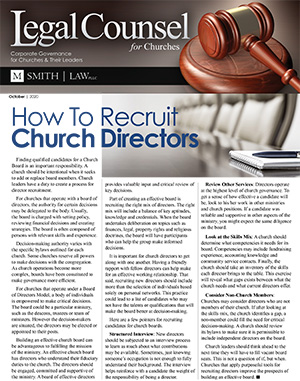Finding qualified candidates for a Church Board is an important responsibility. A church should be intentional when it seeks to add or replace board members. Church leaders have a duty to create a process for director recruitment.
For churches that operate with a board of directors, the authority for certain decisions may be delegated to the body. Usually, the board is charged with setting policy, reviewing financial decisions and creating strategies. The board is often composed of persons with relevant skills and experience.
Decision-making authority varies with the specific bylaws outlined for each church. Some churches reserve all powers to make decisions with the congregation. As church operations become more complex, boards have been constituted to make governance more efficient.
For churches that operate under a Board of Directors Model, a body of individuals is empowered to make critical decisions. The board could be a particular ministry, such as the deacons, trustees or team of ministers. However the decision-makers are situated, the directors may be elected or appointed to their posts.
Building an effective church board can be advantageous to fulfilling the mission of the ministry. An effective church board has directors who understand their fiduciary duties to the church. The directors should be engaged, committed and supportive of the ministry. A board of effective directors provides valuable input and critical review of key decisions.
Part of creating an effective board is recruiting the right mix of directors. The right mix will include a balance of key aptitudes, knowledge and credentials. When the board undertakes deliberation on topics such as finances, legal, property rights and religious doctrines, the board will have participants who can help the group make informed decisions.
It is important for church directors to get along with one another. Having a friendly rapport with fellow directors can help make for an effective working relationship. That said, recruiting new directors should include more than the selection of individuals based solely on personal networks. This practice could lead to a list of candidates who may not have the talents or qualifications that will make the board better at decision-making.
Here are a few pointers for recruiting candidates for church boards.
Structured Interview: New directors should be subjected to an interview process to learn as much about what contributions may be available. Sometimes, just knowing someone’s occupation is not enough to fully understand their background. The interview helps reinforce with a candidate the weight of the responsibility of being a director.
Review Other Services: Directors operate at the highest level of church governance. To get a sense of how effective a candidate will be, look to his/her work in other ministries and church positions. If a candidate was reliable and supportive in other aspects of the ministry, you might expect the same diligence on the board.
Look at the Skills Mix: A church should determine what competencies it needs for its board. Competencies may include fundraising experience, accounting knowledge and community service contacts. Finally, the church should take an inventory of the skills each director brings to the table. This exercise will reveal what gaps exists between what the church needs and what current directors offer.
Consider Non-Church Members: Churches may consider directors who are not members of their church. If after looking at the skills mix, the church identifies a gap, a non-member could fill the need for critical decision-making. A church should review its bylaws to make sure it is permissible to include independent directors on the board.
Church leaders should think ahead to the next time they will have to fill vacant board seats. This is not a question of if, but when. Churches that apply purposeful tools for recruiting directors improve the prospects of building an effective board.

